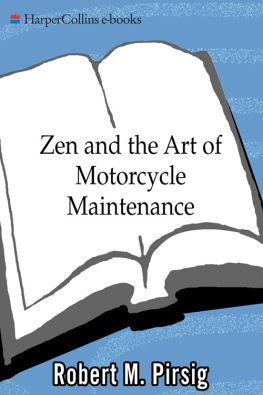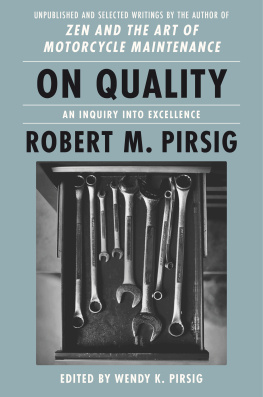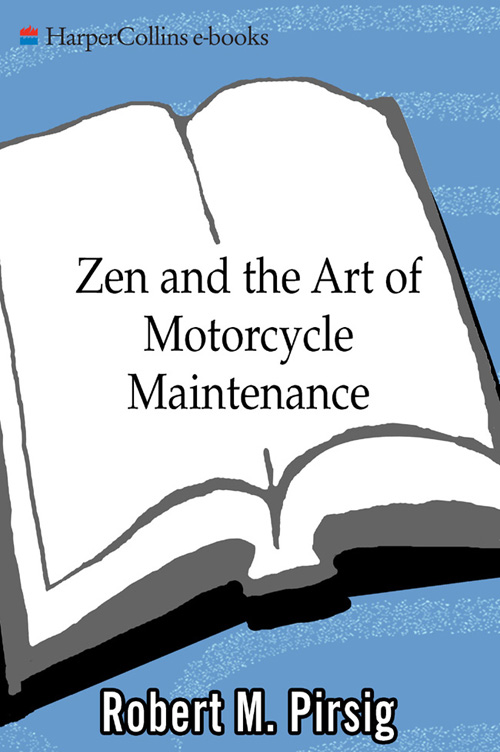I suppose every writer dreams of the kind of success Zen and the Art of Motorcycle Maintenance has had in the past twenty-five yearsrave reviews, millions of copies sold in twenty-three languages, a description in the press as the most widely read philosophy book, ever.*
In the early seventies when it was being written, I had those dreams, of course, but didnt let myself dwell on them or express them publicly for fear they would be interpreted as megalomania and a regression to my former mental illness. Now the dreams are a reality and I dont have to worry about that anymore.
But rather than recount a success that everyone knows, it would be of higher quality now to write about the books failures, and maybe help correct them. There are two that stand outa minor one and a major one.
The minor one is that Phaedrus doesnt mean wolf in Greek. That was a mistake that grew out of the actual experience at the University of Chicago in 1960 that appears in Part IV. The professor of philosophy had mentioned that Plato liked to use names for his characters that suggested the nature of their personality, and in the dialogue Phaedrus , the likeness was made to a wolf. The professor, whose actual name I recall as either Lamm or Lamb, looked at me in such a way as to indicate he thought the title of wolf fit me. I was an outsider who seemed more interested in attacking what was being taught than learning from it. My hyperactive mind seized upon this as my definitive relationship to the school, and this worked its way into the book. But the character whom Plato likened to a wolf was not Phaedrus but Lycias, whose name is similar to the Greek lykos that does mean wolf. As readers have pointed out to me many times, Phaedrus actually means brilliant or radiant. I was lucky. It could just as easily have meant something much worse.
The second error is much more serious because it has obscured the fundamental meaning of the book. Many people have noticed that the ending somehow does not clear things up, that something is missing. Some have called it a Hollywood ending that undermines the artistic integrity of the book. They are right, but this is not because a Hollywood ending was intended. It is because a much different ending was intended that was not sufficiently clear. In the intended ending it is not the narrator who triumphs over a villainous Phaedrus. It is an honorable Phaedrus who triumphs over the narrator that has been maligning him all the time. This is now made clearer in this edition by using a sans-serif type for Phaedruss voice.
To expand on this, let me go back to a creative writing seminar held on winter afternoons in the early 1950s at the University of Minnesota. The teacher was Allen Tate, a distinguished poet and literary critic. Our subject for many sessions was Henry Jamess The Turn of the Screw , in which a governess tries to shield her two protgs from a ghostly presence but in the end fails, and they are killed. I was completely convinced that this was just a straightforward ghost story, but Tate said no, Henry James is up to more than that. The governess is not the heroine of this story. She is the villainess. It is not the ghost who kills the children but the governesss hysterical belief that a ghost exists. I couldnt believe this at first, but reread the story and saw that Tate was right. You can interpret it either way.
How could I have missed it?
Tate explained that James was able to achieve this magic through the use of the first-person narrator. Tate said that the first person is the most difficult form because the writer is locked inside the head of the narrator and cant get out. He cant say meanwhile, back at the ranch as a transition to another subject because he is imprisoned forever inside the narrator. But so is the reader! And that is the strength of the first-person narrative. The reader does not see that the governess is the villainess because what the governess sees is all the reader ever sees.
Now come back to Zen and the Art of Motorcycle Maintenance and note the similarities. There is a narrator whose mind you never leave. He refers to an evil ghost named Phaedrus, but the only way you know this ghost is evil is because the narrator tells you so. During the story, Phaedrus appears in the narrators dreams in such a way that you begin to see that not only is the narrator pursuing Phaedrus in order to destroy him but Phaedrus is also pursuing the narrator for the same purpose. Who will win?
There is a divided personality here: two minds fighting for the same body, a condition that inspired the original meaning of schizophrenia. These two minds have different values as to what is important in life.
The narrator is primarily a person dominated by social values. As he says at the beginning, I havent really had a new idea in years. He never tells his story except in ways that are calculated to make you like him. His private thoughts he will share with you, but not with John or Sylvia or Chris or the DeWeeses. Above all, he does not want to be isolated from youthe readeror from society around him. He maintains a careful position within the normal boundaries of his surrounding society because he has seen what has happened to Phaedrus who did not. He has learned his lesson. No more shock treatment for him. Only at one point does the narrator confess his secret: that he is a heretic who is congratulated by everyone for having saved his soul but who knows secretly that all he has saved is his skin.
There are only two others who know or sense this. Chris is one. He is going to pieces with confusion and grief as he looks for the father he remembers and loves and cant find anymore. Phaedrus is the other. He knows completely what the narrator is up to and despises him for it.
In Phaedruss view the narrator is a sellout, a coward, who has abandoned truth for popularity and social acceptance by his psychiatrists, his family, his employers, and his social acquaintances. He sees that the narrator doesnt want to be honest anymore, just an accepted member of the community, bowing and accommodating his way through the rest of his years.
Phaedrus was dominated by intellectual values. He didnt give a damn who liked or didnt like him. He was single-mindedly pursuing a truth he felt was of staggering importance to the world. The world had no idea of what he was trying to do and it was trying to kill him for his trouble. Now he had been socially destroyedsilenced. But the residue of what he knew still lingered in the narrators brain, and that was the source of the conflict.
In the end it is Chriss agony that releases Phaedrus. When Chris asks, Were you really insane, and the answer is No, it is not the narrator but Phaedrus who answers. And when Chris says, I knew it, he also understands that for the first time on this whole trip he is talking to his long-lost father again. The tension is gone. They have won it. The dissembling narrator has vanished. Its going to get better now, Phaedrus says. You can sort of tell these things.










